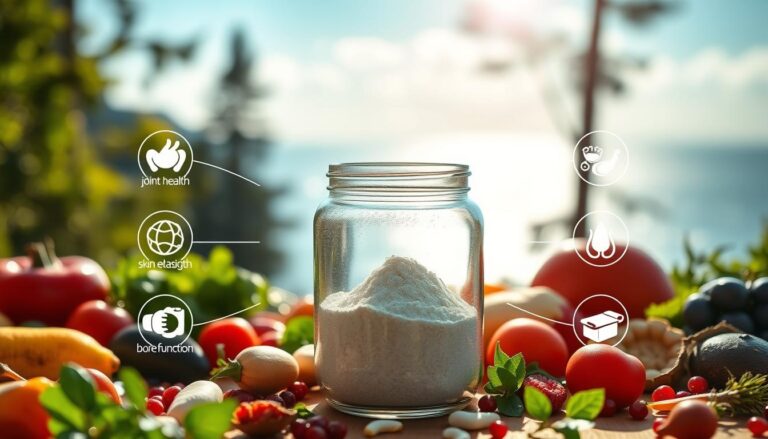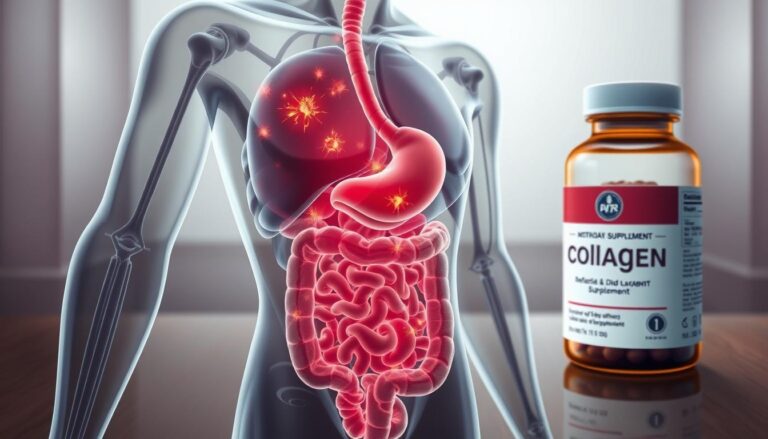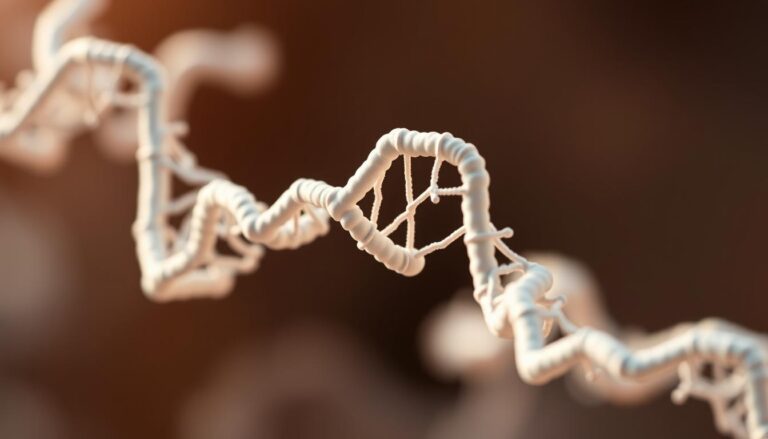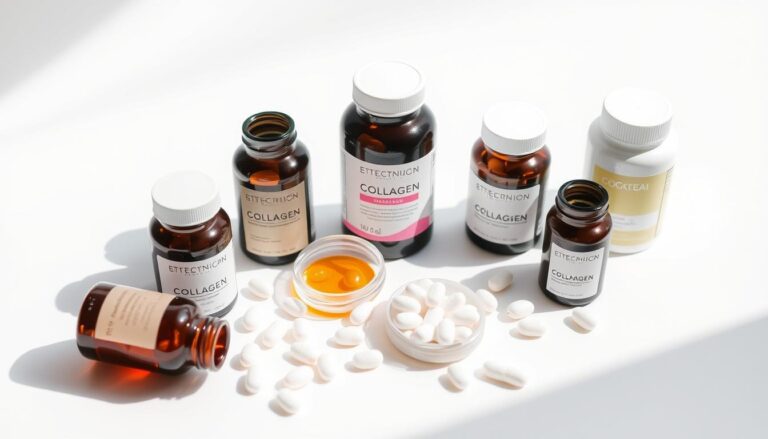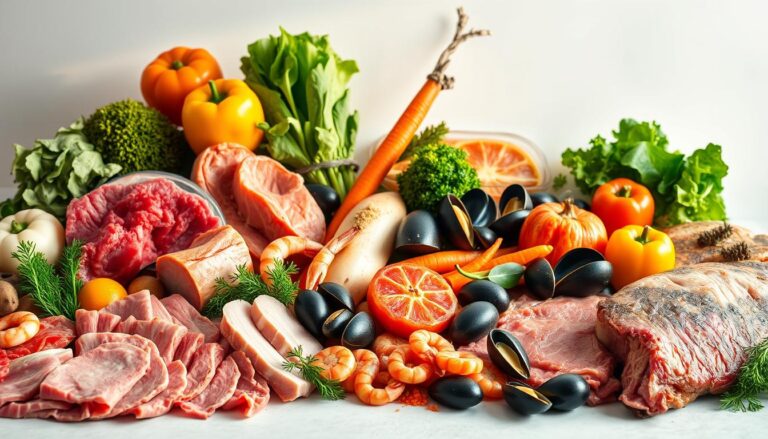Is Collagen Safe During Pregnancy? A Research-Based Guide
As an expecting mother, you’re probably wondering about keeping yourself healthy. Collagen supplements are getting more popular, making you think about their safety during pregnancy. You might be looking into collagen for better skin and joint health. But, it’s important to know what research and experts say.
It’s key to know if collagen is safe during pregnancy to make smart health choices. Even though collagen is usually safe, it’s good to look at the research and what experts think. This way, you can take the best care of yourself and your baby.
Table of Contents
Understanding Collagen and Its Popularity
Collagen is the most common protein in our bodies. It’s key for our health, making up our skin, bones, and connective tissue. This is why collagen is so popular in beauty and wellness.
What Is Collagen and Why Is It Important?
Collagen is a protein that keeps our skin, bones, and connective tissue strong. It’s vital for keeping our skin elastic and our joints healthy. There are mainly Types I, II, and III of collagen.
Types of Collagen in the Human Body
Our bodies have 28 different types of collagen, each with its own job:
- Type I: Found in skin, tendons, and bones
- Type II: Primarily found in cartilage
- Type III: Commonly found in blood vessels and muscles
Natural Collagen Production and Aging
As we get older, our bodies make less collagen. This leads to wrinkles, joint pain, and less elastic skin. Knowing this helps us understand the benefits and risks of collagen supplements, especially during pregnancy.
Learning about collagen’s role in our bodies helps us make better choices. This is especially true if you’re thinking about taking collagen supplements while pregnant.
Pregnancy and Your Body’s Collagen Needs
As your pregnancy goes on, your body needs more collagen. This is because of many changes happening in your body. These changes can affect how much collagen your body makes.
Collagen is a key protein that helps keep your skin, bones, and connective tissue strong. Knowing how pregnancy affects collagen is key. It helps you understand what to expect and make good health choices.
How Pregnancy Affects Collagen Production
Pregnancy brings big hormonal shifts that can change collagen production. These shifts can cause skin to lose its stretchiness and joints to feel stressed.
Hormonal Changes and Their Impact
The hormonal changes in pregnancy, especially the rise in estrogen, can alter collagen production. Estrogen can boost collagen making, which might make your skin more elastic. But, these changes can also make your skin more sensitive and prone to problems.
Increased Demand for Collagen During Pregnancy
Your body needs more collagen during pregnancy. This is because your skin stretches and your joints get stressed. This need is natural as your body gets ready for the baby and childbirth. Getting enough collagen can help keep you healthy and ease some pregnancy discomforts.
Understanding how collagen changes during pregnancy helps you make better health choices. You might consider collagen supplements or other treatments to support your health.
Is Collagen Safe During Pregnancy? What Research Shows
More women are using collagen supplements for their skin, hair, and joint health. It’s important to look at the research on its safety during pregnancy.
Current Scientific Evidence on Collagen Safety
Studies say collagen is usually safe for pregnant women. But, the quality of supplements can differ a lot. Good collagen comes from natural sources and is processed well to avoid harmful stuff.
Studies on Collagen Supplementation During Pregnancy
Many studies have looked into collagen’s safety and benefits during pregnancy. A study in the Journal of Cosmetic Dermatology found it helps with skin elasticity. This is good because skin stretches a lot during pregnancy.
Another study stressed the need for high-quality supplements to avoid harmful substances. Here are some key findings from recent studies:
| Study | Findings | Relevance to Pregnancy |
|---|---|---|
| Journal of Cosmetic Dermatology | Improved skin elasticity | Potential reduction in stretch marks |
| Nutrition Research | No adverse effects reported | Suggests safety during pregnancy |
What Medical Organizations Say About Collagen Use
Big medical groups haven’t given specific advice on collagen during pregnancy. But, they say it’s key to talk to a doctor before taking any supplements.
“It’s always best to consult with a healthcare provider before adding any supplements to your diet, especially during pregnancy.”
In short, collagen seems safe based on research. But, pregnant women should choose high-quality supplements and talk to their doctors.
Potential Benefits of Collagen During Pregnancy
Collagen plays a key role in pregnancy, helping with skin health. Your body changes a lot during pregnancy, affecting your skin. Collagen, a vital protein for skin, might help keep your skin healthy.
Skin Elasticity and Stretch Mark Prevention
Collagen might improve skin elasticity, which could reduce stretch marks. Skin elasticity is important because your skin stretches a lot during pregnancy. Keeping your skin elastic can help avoid or lessen stretch marks.
Mechanism of Action for Skin Support
Collagen supplements may boost skin elasticity by adding amino acids like glycine, proline, and hydroxyproline. These amino acids are key for making collagen. This could help keep your skin elastic.
Anecdotal vs. Clinical Evidence
Many people say collagen helps their skin during pregnancy, but clinical evidence is still growing. Some studies show collagen can make skin more elastic. But, we need more research to know for sure.
Let’s look at some data on collagen during pregnancy:
| Study | Collagen Dosage | Results |
|---|---|---|
| Study 1 | 10g/day | Improved skin elasticity |
| Study 2 | 5g/day | Reduced appearance of stretch marks |
| Study 3 | 15g/day | Significant improvement in skin hydration |

In summary, collagen might be good for pregnancy skin, but we need more studies. Always talk to a doctor before taking collagen during pregnancy.
Possible Risks and Concerns of Collagen Supplementation
The trend of collagen supplements is growing, but it raises safety questions for pregnant women. Collagen is usually safe, but using it during pregnancy comes with risks.
Contaminants and Quality Control Issues
One big worry is contamination in collagen supplements. Collagen supplements, like other dietary supplements, are not strictly regulated. This means their quality can vary a lot between makers.
Heavy Metals and Other Potential Toxins
Some collagen supplements might have heavy metals like lead, mercury, or arsenic. These can be very harmful, especially for pregnant women and their babies.
Regulatory Oversight of Supplements
The rules for dietary supplements, including collagen, are different from drugs. The FDA does not pre-approve dietary supplements before they are marketed. This can cause quality issues.
To better understand the risks, let’s look at how collagen supplements are regulated:
| Regulatory Aspect | Dietary Supplements | Pharmaceuticals |
|---|---|---|
| Pre-market Approval | No | Yes |
| Manufacturing Standards | Variable, depends on manufacturer | Strict, regulated by FDA |
| Post-market Surveillance | Yes, but often relies on consumer reporting | Yes, rigorous monitoring |
The lack of strict rules for dietary supplements like collagen can be risky for users, especially pregnant women.
When thinking about collagen supplements during pregnancy, it’s important to think about the risks and benefits. Always talk to a healthcare provider before starting any supplements.
Types of Collagen Products and Their Pregnancy Safety Profiles
Collagen supplements are getting more popular, especially among pregnant women. They come in different types and sources. This includes marine, bovine, and chicken sources.
Oral Supplements: Powders, Pills, and Liquids
Collagen supplements are available in powders, pills, and liquids. Powders are flavored and can be mixed into drinks. Pills are easy to use and have a set dose. Liquids might be easier to absorb.
Marine vs. Bovine vs. Chicken Collagen Sources
The type of collagen matters for safety during pregnancy. Marine collagen comes from fish, bovine collagen from cows, and chicken collagen from chickens. Each has its own benefits and risks.
| Collagen Source | Potential Benefits | Safety Concerns |
|---|---|---|
| Marine | High bioavailability, rich in Type I collagen | Risk of heavy metal contamination, potential allergenicity |
| Bovine | Abundant source, rich in Type I and III collagen | BSE (Bovine Spongiform Encephalopathy) risk, potential for contamination |
| Chicken | Lower risk of BSE, rich in Type II collagen | Potential for avian flu contamination, less studied than bovine or marine |
Processing Methods and Their Safety Implications
How collagen is processed affects its safety. Hydrolyzation breaks it down into smaller peptides. This might improve absorption. But, the processing conditions can impact purity and safety.
When picking a collagen supplement, think about the source and processing. Choose products tested by third-party groups. Also, look for clear labels on sourcing and manufacturing.
Natural Alternatives to Boost Collagen During Pregnancy
There are many natural ways to boost collagen during pregnancy, aside from supplements. Making dietary changes is a safe and effective way to meet your body’s collagen needs.
Collagen-Boosting Foods Safe for Pregnancy
Some foods can naturally increase collagen production. They offer a good alternative to supplements. Foods high in vitamin C and protein are especially helpful.
Vitamin C-Rich Foods for Collagen Synthesis
Vitamin C is key for making collagen. Add citrus fruits like oranges and grapefruits, strawberries, and leafy greens like spinach to your meals. They help support collagen production.
Protein-Rich Foods That Support Collagen Production
Eating a lot of protein is important for collagen. Include lean meats like chicken and turkey, fish with omega-3s, and legumes like beans and lentils. They give your body the amino acids it needs for collagen.
Here’s a quick list of collagen-boosting foods safe during pregnancy:
| Food Category | Examples | Benefits |
|---|---|---|
| Vitamin C-Rich Foods | Citrus fruits, strawberries, leafy greens | Supports collagen synthesis |
| Protein-Rich Foods | Lean meats, fish, legumes | Provides amino acids for collagen production |
By eating these foods, you can naturally help your body make more collagen. This keeps your skin and joints healthy during pregnancy.
How to Choose Safe Collagen Products If You Decide to Use Them
If you’re pregnant and thinking about collagen supplements, picking a safe one is key. There are many options, making it hard to choose. But, by looking at certain quality signs, you can make a good choice.
Quality Indicators and Third-Party Testing
Third-party testing is a big deal for collagen product safety. It means independent labs check the product’s purity and quality. Look for products that have been tested well to make sure they’re safe and as claimed.
Certifications to Look For
Some certifications show a product’s quality and safety. These include:
- NSF International: Certifies products for quality and safety.
- Informed-Choice: Ensures products are safe for athletes and compliant with anti-doping regulations.
- ConsumerLab.com: Tests products for quality and compliance with label claims.
Transparency in Sourcing and Manufacturing
How open a company is about where they get their stuff and how they make it matters. Companies that share this info are more likely to make safe, effective products.
When picking a safe collagen product for pregnancy, read labels well. Look for quality indicators like third-party testing and certifications. This way, you can avoid risks and get the most benefits.
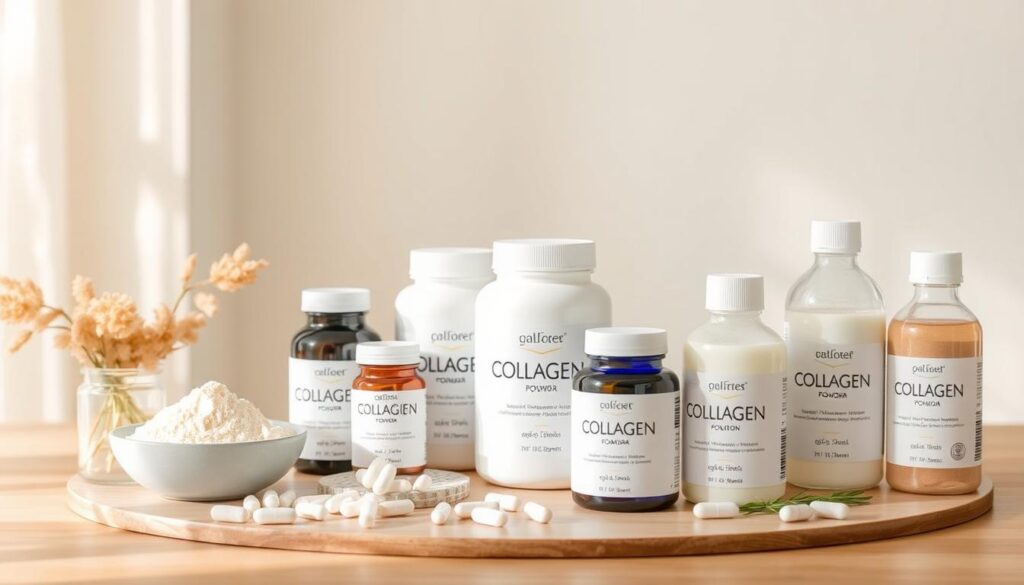
Finally, deciding on collagen supplements during pregnancy should be talked over with a healthcare provider. They can help you see the good and bad sides. This way, you can choose what’s best for your health.
Conclusion: Making Informed Decisions About Collagen During Pregnancy
When you’re looking to keep your skin healthy during pregnancy, be careful with collagen supplements. Research shows they might help, but you need to think about the risks.
Always talk to your doctor before taking any supplements. They can tell you if the benefits outweigh the risks for you. This way, you make a choice that’s right for your health and pregnancy.
Choosing the right collagen product is key. Look for ones that have been tested by third-party groups. This way, you can be sure you’re getting a safe and effective product.
Your health and your baby’s health are the most important things. By doing your research and talking to your doctor, you can make choices that are best for you during pregnancy.

